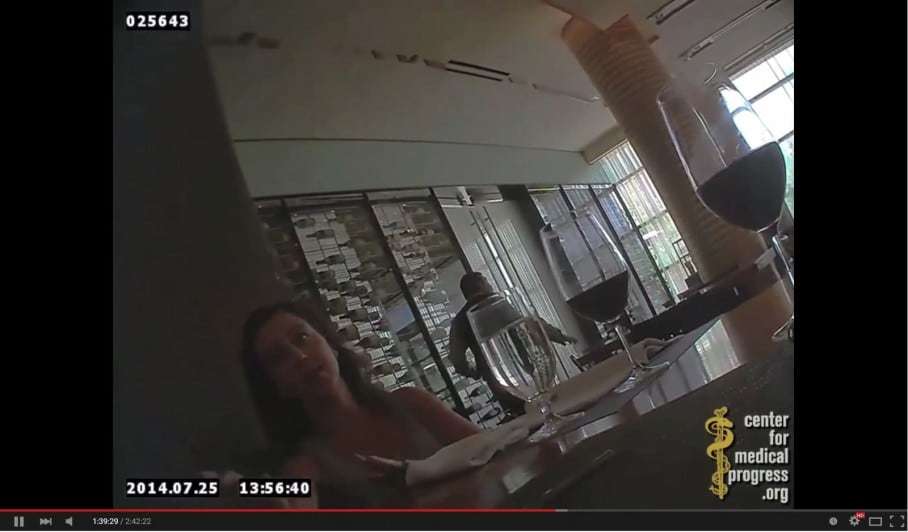The Volokh Conspiracy
Mostly law professors | Sometimes contrarian | Often libertarian | Always independent
Judge in StemExpress case now seems inclined not to continue pretrial injunction against release of videos

Two weeks ago, I blogged about StemExpress v. Center for Medical Progress, in which the court temporarily blocked the center from releasing surreptitiously recorded video of a conversation with "leaders of a California company that provides fetal tissue to researchers." But it appears that the trial judge is inclined not to turn the temporary restraining order into a more lasting preliminary injunction when that order expires.
StemExpress had asked the court to order pretrial discovery in the case, something that normally wouldn't be allowed at this stage under California law. The court rejected the request, and in the process expressed broader views about the merits of the case. I quote from the judge's tentative ruling, which I am told the judge verbally adhered to at the hearing Thursday (some paragraph breaks added):
Plaintiff's motion to conduct specified discovery under Code of Civil Procedure Section 425.16(g) is denied. Section 425.16(g) stays all discovery in an action upon the filing of a special motion to strike (anti-SLAPP). The Court, for good cause shown, may order that "specified discovery" be conducted notwithstanding the general prohibition. Plaintiff seeks to demonstrate that such good cause exists. However, Plaintiff's papers fail to make that showing.
Because Plaintiff seeks discovery in support of its effort to obtain a preliminary injunction, to qualify for the "good cause shown" exception, the discovery Plaintiff wants to conduct must be necessary to support that effort. Indeed, … the Court abuses its discretion when permitting discovery into matters "before determining whether there [is] a reasonable probability the court [will] ever reach that issue." …
Plaintiff does not persuade the Court that the discovery it seeks is necessary to obtain the preliminary injunction. That is because it appears unlikely that the Court is going to grant the preliminary injunction. The injunction Plaintiff seeks would prevent Defendants from disseminating the videotapes.
First, this proposed injunction would constitute a prior restraint on the Defendants' rights under the First Amendment and the parallel protections under the California Constitution. US Const. Amend. I; Cal. Const. Art. 1, § 2. Therefore, it is unlikely that the preliminary injunction will ultimately be granted. Wilson v. Superior Court of Los Angeles County (Watson) (1975) 13 Cal.3d 652, 658; Elrod v. Burns (1976) 427 U.S. 347, 373 ("The loss of First Amendment freedoms, for even minimal periods of time, unquestionably constitutes irreparable injury."); see also San Diego Unified Port District v. U.S. Citizens Patrol (1998) 63
Cal.App.4th 964, 970 (noting that California's free-speech protections are "more protective, definitive and inclusive of rights to expression of speech than their federal counterparts."). This general prohibition on prior restraints even applies to speech whose publication is false, defamatory, violative of privacy rights or otherwise tortious. Gilbert v. National Enquirer, Inc. (1996) 43 Cal.App.4th 1135, 1148; Evans v. Evans (2008) 162 Cal.App.4th 1157, 1168.Second, even if Plaintiff's evidence demonstrates that the videotapes were obtained in violation of Penal Code Section 632, Section 632 does not prohibit the disclosure of information gathered in violation of its terms. Lieberman v. KCOP Television, Inc. (2003) 110 Cal.App. 4th 156, 167. For that reason, the Court is unlikely to enjoin the dissemination of the tapes.
Nor does Penal Code Section 637.2 help Plaintiffs. That section permits a person injured by a violation of Penal Code Section 632 "to bring an action to enjoin and restrain" such violation. It does not permit an action to prevent the dissemination of the unlawfully obtained recording.
Accordingly, even if Plaintiff may demonstrate a probability - even an overwhelming probability - that it will prevail on the merits of its claims under Penal Code Section 632, it will not be entitled to injunctive relief. As a result there is no good cause to permit discovery under CCP § 425.16(g), as it has not been demonstrated that there is "a reasonable probability the court [will] ever reach [the] issue[s]" of the probability of prevailing on the merits of the Plaintiff s causes of action or the imminent nature of the harm to be enjoined.
There are counterarguments to this, to be sure. I noted some of the complexities surrounding the prior restraint question here. Moreover, California law sometimes authorizes judges to respond to violations of statutes by issuing injunctions that go beyond the statute (in this case, the argument would be that an injunction against publication is essentially a way to stop the Center from benefiting from its ill-gotten gains, if the recording was in fact illegally recorded); to quote People v. Custom Craft Carpets Inc. (Cal. Ct. App. 1984),
It is beside the point whether or not [the prohibitory statute at issue in this case] authorizes [the injunction issued by the court]. Custom Craft cites no authority for its proposal that a court may only enjoin a practice if the Legislature has already disapproved that practice. On the contrary, while an injunction may not go against statutory law, it may go beyond statutory law. A court sitting in equity has broad power to fashion relief to fit the facts before it.
Nonetheless, the trial judge seems to have been persuaded by the Center for Medical Progress's arguments as to the preliminary injunction. And it certainly makes sense that, given the complicated First Amendment issue (again, see the original post), the judge wouldn't want to proceed in the absence of specific statutory authorization.
You can read StemExpress's arguments and the Center for Medical Progress's response; see also this post from Thursday by Ken White (Popehat).


Show Comments (0)